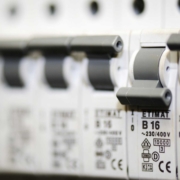Common Fuse Box Problems
What are the Most Common Fuse Box Problems?
 A fuse box is crucial for ensuring that each circuit in your building receives the correct amount of power. Not only does this allow you to keep all your appliances running without interruption, but it also prevents the risk of electrical fires. A functioning fuse box is a vital part of a safe and happy building. But sometimes a fuse box can develop problems.
A fuse box is crucial for ensuring that each circuit in your building receives the correct amount of power. Not only does this allow you to keep all your appliances running without interruption, but it also prevents the risk of electrical fires. A functioning fuse box is a vital part of a safe and happy building. But sometimes a fuse box can develop problems.
A faulty fuse box will soon make itself known. And it can lead to scenarios where stress levels skyrocket. This is why you need to be aware of the most common fuse box problems. With this information in hand you can take steps to both prevent and repair any issues with your fuse box.
What are the Symptoms of a Failing Fuse Box?
You don’t need to be a qualified electrician to understand when you have a bad fuse box on your hands. When an electrical fault begins to develop then the symptoms are noticeable and many. Make sure you keep an eye out for these two major symptoms:
- Circuits which become overloaded will blow the fuses in question and disconnect any associated devices. This is the most common sign that a fuse box is faulty.
- A burning smell will often indicate that the fuses are burning out and further evidence will be present in the form of burn marks on the fuse box.
If either of these symptoms is present then it’s likely that you’re working with a problematic fuse box.
The Most Common Fuse Box Problems
You’re now clear on what the symptoms of a faulty fuse box are, but what is it that’s causing them? Let’s take a closer look at the most common problems:
- A Faulty Appliance: Sometimes a faulty fuse box is the result of one single appliance. This could be a kettle, a laptop or a hairdryer. Regardless of the device, any electrical fault present can cause your fuse box to trip time and time again. The only way to identify a faulty appliance is by unplugging everything in each room and plugging them back in until the circuit trips and identifies the device.
- Poor Wiring: Fuse boxes can undergo a lot of maintenance work during their lifetime and this can lead to the installation of poor wiring. Wiring that has become damaged poses a major risk of electrical fire as does installing wire which is the incorrect size. Any wiring issues need an electrician to investigate immediately.
- Circuits Being Overloaded: Modern buildings are full of electrical devices and, sometimes, this can put significant strain on your fuse box. And this is particularly noticeable when extension sockets are being used. An overloaded fuse box can be very dangerous, so it’s important you carry out an audit of how many devices are running off each circuit.
Dealing with Faulty Fuse Boxes
A faulty fuse box is an electrical system which needs to be treated with care and respect. And that’s why you should always use the services of a professional. Without the necessary knowledge and qualifications, you’re going to cause more damage and risk serious injury by delving deep into the inner workings of a fuse box.
Stay safe and work with a qualified professional who can fix your problem and stop it occurring again in the future. 
View the video ‘Common Fuse Box Problems’
Click here to learn more about electrical testing for fuse boxes



